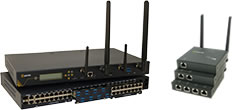
Ovum study finds Asia Pacific leading in IPv6 adoption
By Donna DonowitzJuly 14, 2011
A new study from Ovum has found that pressure from major players such as telecom companies and Internet service providers (ISPs) is falling on deaf ears and enterprises in regions other than the Asia Pacific region see no critical need to start the transition to IPv6 now. The report is titled IPv6 Transition: What’s the rush? Numbers in Ovum’s new IPv6 report suggest less than three percent of worldwide Internet traffic at present is from IPv6.
According to Ovum analyst Mike Sapien, “There may be a degree of ‘head in sand’ mentality among most enterprise customers, but our research stands in glaring contrast to the industry’s efforts to promote IPv6 over the past several years. Furthermore our research suggests that many enterprise customers think they are already using IPv6, when they are not.”
The new Internet protocol IPv6 is seen by many as essential to the future growth of the Internet as it opens up a wealth of new address space for web portals, devices, and applications.
This urgency in Asia Pacific region is being prompted by the announcement by APNIC (Asia Pacific Network Information Centre) that the free pool of IPv4 addresses has been effectively exhausted.
While there are still some IPv4 addresses in reserve, this is the first regional announcement and it will likely not be the last. Ovum reports that it expects that this announcement will be followed by other regions soon. Still, IPv4 address availability isn’t the only factor influencing adoption.
The Asia Pacific is the top growth region globally. The region manufactures many electronic devices and a large number of companies see this as their key expanding region. In addition, many enterprise customers are doing business with vendors and/or customers in this region. For these reasons the Asia Pacific region could influence the faster pace of IPv6 adoption globally.
According to the Ovum report, one of the biggest reasons for global enterprises’ lack of urgency is that there are still plenty of IPv4 addresses available, meanwhile issues such as a lack of return on investment (ROI) and more pressing IT priorities are also playing a part.
The report goes on to say that there are some triggers that will motivate enterprises to make the transition from IPv4 to IPv6. These triggers include the growing number of new consumer devices, such as smartphones, that will be assigned IPv6 addresses, and the new web applications that will be accessed by these devices.



